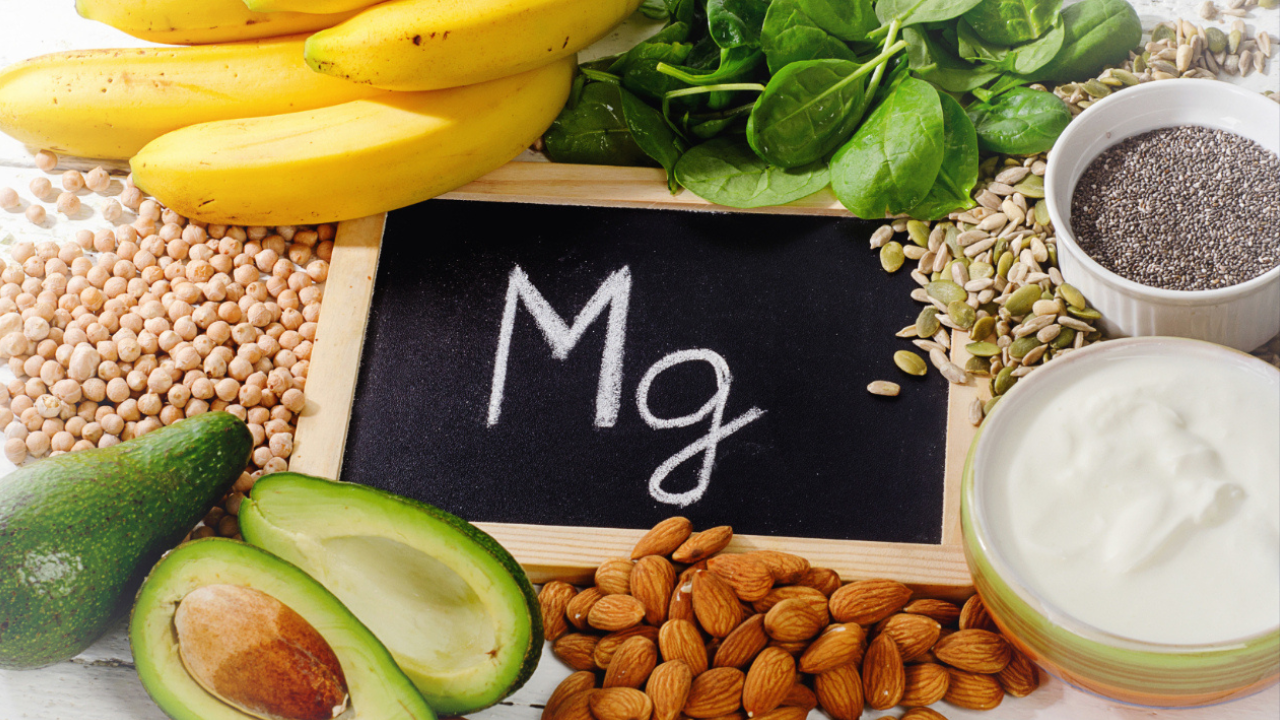𝐌𝐚𝐠𝐧𝐞𝐬𝐢𝐮𝐦 𝐟𝐨𝐫 𝐚 𝐂𝐚𝐥𝐦 𝐁𝐫𝐚𝐢𝐧

𝖸𝗈𝗎 𝗆𝗂𝗀𝗁𝗍 𝗁𝖺𝗏𝖾 𝗁𝖾𝖺𝗋𝖽 𝗈𝖿 𝗆𝖺𝗀𝗇𝖾𝗌𝗂𝗎𝗆 𝖻𝖾𝖿𝗈𝗋𝖾, 𝖻𝗎𝗍 𝖽𝗂𝖽 𝗒𝗈𝗎 𝗄𝗇𝗈𝗐 𝗂𝗍'𝗌 𝖺𝖼𝗍𝗎𝖺𝗅𝗅𝗒 𝗉𝗋𝖾𝗍𝗍𝗒 𝗂𝗆𝗉𝗈𝗋𝗍𝖺𝗇𝗍 𝖿𝗈𝗋 𝗄𝗂𝖽𝗌' 𝖻𝗋𝖺𝗂𝗇 𝗁𝖾𝖺𝗅𝗍𝗁? 𝖲𝗍𝗎𝖽𝗂𝖾𝗌 𝗌𝗁𝗈𝗐 𝗍𝗁𝖺𝗍 𝖼𝗁𝗂𝗅𝖽𝗋𝖾𝗇 𝗐𝗂𝗍𝗁 𝖠𝖣𝖧𝖣 𝖺𝗇𝖽 𝖺𝗎𝗍𝗂𝗌𝗆 𝗆𝗂𝗀𝗁𝗍 𝗁𝖺𝗏𝖾 𝗅𝗈𝗐𝖾𝗋 𝗅𝖾𝗏𝖾𝗅𝗌 𝗈𝖿 𝗆𝖺𝗀𝗇𝖾𝗌𝗂𝗎𝗆 𝗂𝗇 𝗍𝗁𝖾𝗂𝗋 𝖻𝗅𝗈𝗈𝖽.
𝖠𝗍𝗍𝖾𝗇𝗍𝗂𝗈𝗇 𝖺𝗇𝖽 𝖥𝗈𝖼𝗎𝗌: 𝖬𝖺𝗀𝗇𝖾𝗌𝗂𝗎𝗆 𝗁𝖾𝗅𝗉𝗌 𝗋𝖾𝗀𝗎𝗅𝖺𝗍𝖾 𝗇𝖾𝗎𝗋𝗈𝗍𝗋𝖺𝗇𝗌𝗆𝗂𝗍𝗍𝖾𝗋𝗌 𝗂𝗇 𝗍𝗁𝖾 𝖻𝗋𝖺𝗂𝗇 𝗍𝗁𝖺𝗍 𝖺𝗋𝖾 𝗄𝖾𝗒 𝖿𝗈𝗋 𝗉𝖺𝗒𝗂𝗇𝗀 𝖺𝗍𝗍𝖾𝗇𝗍𝗂𝗈𝗇. 𝖮𝗇𝖾 𝗌𝗍𝗎𝖽𝗂𝖾𝗌 𝗌𝗁𝗈𝗐𝖾𝖽 𝗍𝗁𝖺𝗍 𝗄𝗂𝖽𝗌 𝗐𝗂𝗍𝗁 𝖠𝖣𝖧𝖣 𝗐𝗁𝗈 𝗍𝗈𝗈𝗄 𝗆𝖺𝗀𝗇𝖾𝗌𝗂𝗎𝗆 𝖿𝗈𝗋 𝗌𝗂𝗑 𝗆𝗈𝗇𝗍𝗁𝗌 𝗁𝖺𝖽 𝗆𝖺𝗃𝗈𝗋 𝗂𝗆𝗉𝗋𝗈𝗏𝖾𝗆𝖾𝗇𝗍𝗌 𝗂𝗇 𝖺𝗍𝗍𝖾𝗇𝗍𝗂𝗈𝗇, 𝗁𝗒𝗉𝖾𝗋𝖺𝖼𝗍𝗂𝗏𝗂𝗍𝗒, 𝖺𝗇𝖽 𝗂𝗆𝗉𝗎𝗅𝗌𝗂𝗏𝗂𝗍𝗒.
𝖬𝗈𝗈𝖽, 𝖲𝗅𝖾𝖾𝗉, 𝖺𝗇𝖽 𝖢𝖺𝗅𝗆𝗇𝖾𝗌𝗌: 𝖬𝖺𝗀𝗇𝖾𝗌𝗂𝗎𝗆 𝗉𝗋𝗈𝗆𝗈𝗍𝖾𝗌 𝗋𝖾𝗅𝖺𝗑𝖺𝗍𝗂𝗈𝗇, 𝗁𝖾𝗅𝗉𝗂𝗇𝗀 𝗄𝗂𝖽𝗌 𝖿𝖺𝗅𝗅 𝖺𝗌𝗅𝖾𝖾𝗉 𝖿𝖺𝗌𝗍𝖾𝗋 𝖺𝗇𝖽 𝗌𝗍𝖺𝗒 𝖺𝗌𝗅𝖾𝖾𝗉 𝗅𝗈𝗇𝗀𝖾𝗋. 𝖬𝖺𝗀𝗇𝖾𝗌𝗂𝗎𝗆 𝗀𝗅𝗒𝖼𝗂𝗇𝖺𝗍𝖾, 𝖿𝗈𝗋 𝖾𝗑𝖺𝗆𝗉𝗅𝖾, 𝗂𝗌 𝗁𝗂𝗀𝗁𝗅𝗒 𝖾𝖿𝖿𝖾𝖼𝗍𝗂𝗏𝖾 𝗂𝗇 𝗆𝖺𝗇𝖺𝗀𝗂𝗇𝗀 𝗂𝗇𝗌𝗈𝗆𝗇𝗂𝖺, 𝗌𝗍𝗋𝖾𝗌𝗌, 𝖺𝗇𝖽 𝖺𝗇𝗑𝗂𝖾𝗍𝗒. 𝖨𝗍 𝖺𝗅𝗌𝗈 𝗁𝖾𝗅𝗉𝗌 𝗐𝗂𝗍𝗁 𝗍𝗁𝖾 𝖿𝗈𝗋𝗆𝖺𝗍𝗂𝗈𝗇 𝗈𝖿 𝗆𝗒𝖾𝗅𝗂𝗇, 𝗍𝗁𝖾 𝗉𝗋𝗈𝗍𝖾𝖼𝗍𝗂𝗏𝖾 𝗌𝗁𝖾𝖺𝗍𝗁 𝗍𝗁𝖺𝗍 𝖺𝗅𝗅𝗈𝗐𝗌 𝖻𝗋𝖺𝗂𝗇 𝖼𝖾𝗅𝗅𝗌 𝗍𝗈 𝖼𝗈𝗆𝗆𝗎𝗇𝗂𝖼𝖺𝗍𝖾 𝖾𝖿𝖿𝗂𝖼𝗂𝖾𝗇𝗍𝗅𝗒.
𝖪𝖾𝗒 𝖥𝗈𝗈𝖽 𝖲𝗈𝗎𝗋𝖼𝖾𝗌 (𝗉𝖾𝗋 𝟣𝟢𝟢𝗀):
-
𝖢𝖺𝖼𝖺𝗈 𝖯𝗈𝗐𝖽𝖾𝗋: 𝟧𝟫𝟫𝗆𝗀
-
𝖭𝗎𝗍𝗌 & 𝖲𝖾𝖾𝖽𝗌: 𝖯𝗎𝗆𝗉𝗄𝗂𝗇 𝗌𝖾𝖾𝖽𝗌, 𝖿𝗅𝖺𝗑 (𝟧𝟥𝟧𝗆𝗀)
-
𝖶𝗁𝗈𝗅𝖾 𝖦𝗋𝖺𝗂𝗇𝗌: 𝖠𝗆𝖺𝗋𝖺𝗇𝗍𝗁, 𝖻𝗎𝖼𝗄𝗐𝗁𝖾𝖺𝗍 (𝟤𝟨𝟨𝗆𝗀)
-
𝖦𝗋𝖾𝖾𝗇 𝖫𝖾𝖺𝗏𝖾𝗌: 𝖲𝗐𝗂𝗌𝗌 𝖼𝗁𝖺𝗋𝖽, 𝗌𝗉𝗂𝗇𝖺𝖼𝗁 (𝟪𝟨𝗆𝗀)
-
𝖡𝖾𝖺𝗇𝗌: 𝖲𝗈𝗒𝖻𝖾𝖺𝗇𝗌, 𝗉𝗂𝗇𝗍𝗈 𝖻𝖾𝖺𝗇𝗌 (𝟪𝟨𝗆𝗀)
𝖯𝗋𝗈𝖿𝖾𝗌𝗌𝗂𝗈𝗇𝖺𝗅 𝖦𝗎𝗂𝖽𝖺𝗇𝖼𝖾: 𝖡𝖾𝖼𝖺𝗎𝗌𝖾 𝗆𝖺𝗀𝗇𝖾𝗌𝗂𝗎𝗆 𝗂𝗌 𝖺 𝖼𝗈𝖿𝖺𝖼𝗍𝗈𝗋 𝗂𝗇 𝗈𝗏𝖾𝗋 𝟥𝟢𝟢 𝖾𝗇𝗓𝗒𝗆𝖺𝗍𝗂𝖼 𝗋𝖾𝖺𝖼𝗍𝗂𝗈𝗇𝗌, 𝗂𝗍 𝗂𝗌 𝗈𝗇𝖾 𝗈𝖿 𝗍𝗁𝖾 𝗆𝗈𝗌𝗍 𝗉𝗋𝖾𝗌𝖼𝗋𝗂𝖻𝖾𝖽 𝗆𝗂𝗇𝖾𝗋𝖺𝗅𝗌. 𝖧𝗈𝗐𝖾𝗏𝖾𝗋, 𝗍𝗁𝖾𝗋𝖺𝗉𝖾𝗎𝗍𝗂𝖼 𝖽𝗈𝗌𝖾𝗌 𝗌𝗁𝗈𝗎𝗅𝖽 𝗈𝗇𝗅𝗒 𝖻𝖾 𝗀𝗂𝗏𝖾𝗇 𝗎𝗇𝖽𝖾𝗋 𝗍𝗁𝖾 𝗀𝗎𝗂𝖽𝖺𝗇𝖼𝖾 𝗈𝖿 𝖺 𝗁𝖾𝖺𝗅𝗍𝗁𝖼𝖺𝗋𝖾 𝗉𝗋𝗈𝖿𝖾𝗌𝗌𝗂𝗈𝗇𝖺𝗅.
𝖸𝗈𝗎𝗋 𝖢𝗁𝗂𝗅𝖽'𝗌 𝖡𝗋𝖺𝗂𝗇 𝖧𝖾𝖺𝗅𝗍𝗁 𝖨𝗌 𝖤𝗏𝖾𝗋𝗒𝗍𝗁𝗂𝗇𝗀! 𝖯𝗅𝖾𝖺𝗌𝖾 𝖽𝗈𝗇'𝗍 𝗅𝖾𝖺𝗏𝖾 𝗂𝗍 𝗍𝗈 𝗀𝗎𝖾𝗌𝗌𝗐𝗈𝗋𝗄. 𝖢𝗈𝗇𝗌𝗎𝗅𝗍 𝖺 𝗊𝗎𝖺𝗅𝗂𝖿𝗂𝖾𝖽 𝗉𝗋𝗈𝖿𝖾𝗌𝗌𝗂𝗈𝗇𝖺𝗅 𝗍𝗈𝖽𝖺𝗒.
Leave a Comment.
We hate SPAM. We will never sell your information, for any reason.



